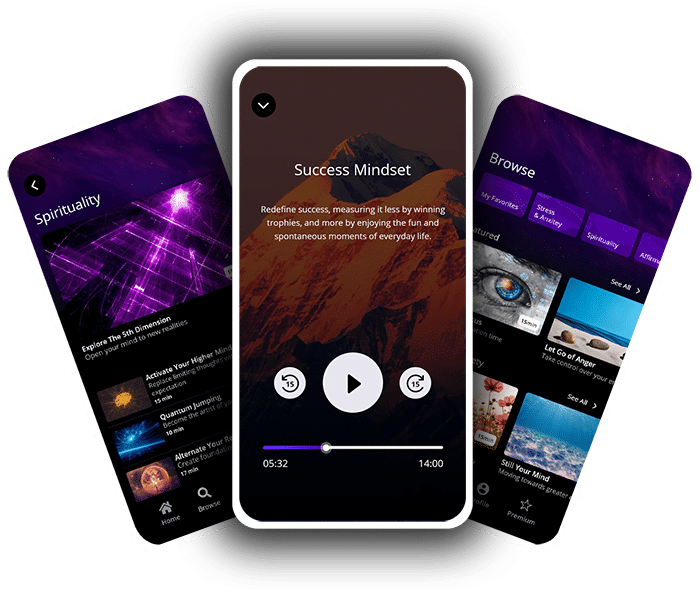Love, in its complexity, often leaves us wondering whether it’s given freely or with strings attached. Consider the term ‘unconditional love,’ which implies a kind of affection devoid of demands or prerequisites.
This blog post will dive into the nuanced differences between conditional and unconditional love, equipping you with clarity to navigate these emotional waters. Exploring this distinction promises to shed light on your relationships and self-worth—critical for personal growth.
Let’s unravel the mystery.

Unleash Your True Potential!
Explore the world of meditation with our powerful guided sessions crafted to bring peace and strength to your spirit.
But first, let’s ensure our sessions are the perfect fit for you.
Take our short quiz to find out!
Table of contents
What Is Conditional Love?
Moving from the broad concept of love, we dive into the specifics of conditional love. It’s a type of affection that comes with strings attached. The person giving this kind of love often sets rules or expectations that must be met.
If you don’t act, think, or behave a certain way, their love may falter or fade.
Imagine your friend will only hang out with you if you have money to spend. Or a partner might only show affection when things are going well. This is conditional love in action – it depends on situations and behaviors rather than being steady and unwavering.
It can shift quickly if the ‘conditions’ change. That’s why some people feel insecure in relationships marked by conditional love; they worry about living up to its demands to keep the bond intact.
What Is Unconditional Love?
Unconditional love comes with no strings attached. It means loving someone completely, without expecting anything in return. Imagine caring for another person without asking for changes or setting terms.
This kind of love is pure and selfless. Those who give it do not keep score of good deeds or mistakes.
This love has a special place in spiritual traditions and personal growth practices. It’s like the sun shining on everyone equally, without picking favorites. Unconditional love accepts flaws and embraces differences, offering support always – even during tough times.
It builds strong bonds in romantic relationships and long-term commitments such as marriage, where “in sickness and in health” truly applies.
In this space of unconditional positive regard, trust thrives and intimacy deepens because people feel safe to be themselves wholly. Compassion grows out of this fertile ground; empathy flows freely between souls connected by such an enduring tie.
With unconditional love lighting the way, individuals experience profound connections that transcend typical emotions or reasons – it is an existence marked by an unwavering presence of heart.

Unleash Your True Potential!
Explore the world of meditation with our powerful guided sessions crafted to bring peace and strength to your spirit.
But first, let’s ensure our sessions are the perfect fit for you.
Take our short quiz to find out!
Key Differences: Conditional Vs Unconditional Love
Exploring the key differences between conditional and unconditional love is like unraveling the threads of human connection, each woven with varied strands of emotion and expectation. Let’s delve into the intricacies of these two distinct forms of love.
| Conditional Love | Unconditional Love |
|---|---|
| Depends on the fulfillment of certain criteria or behaviors. | Exists without prerequisites or qualifications. |
| May lead to feelings of insecurity as it hinges on meeting expectations. | Provides a solid foundation of security, with acceptance at its core. |
| Can give rise to power dynamics, as love is viewed as a commodity. | Encourages equality within relationships, with love given freely. |
| Often wavers with life’s ups and downs, fluctuating with circumstances. | Remains constant through life’s challenges, offering steadfast support. |
| Potentially fosters a transactional relationship dynamic. | Promotes a nurturing environment where growth is celebrated. |
| Views love as a reward for desirable behavior or achievements. | Sees love as an inherent gift, unconditional of personal performance. |
| May create a sense of “earning” love, leading to conditional self-esteem. | Helps build intrinsic self-worth, independent of external validation. |
| Can be limited and withdrawn if conditions aren’t met. | Is enduring and unwavering, regardless of changing conditions. |
Navigating the terrain of love requires understanding these differences, guiding us toward deeper, more authentic connections. The journey continues as we consider the implications of these love dynamics on our lives. Moving forward, let’s reflect on the transformative power of loving without conditions and how it shapes our interactions and self-perception.
Conclusion
Understanding the distinction between conditional and unconditional love is crucial for healthy relationships. While conditional love sets requirements, placing limits on affection, unconditional love offers freedom and acceptance without strings attached.
Recognizing these differences can empower individuals to cultivate meaningful connections based on genuine care and support. Embracing the concept of unconditional love can lead to emotional well-being, fostering a sense of security and belonging in both personal and spiritual realms.
Acknowledging and embracing the power of unconditional love can reshape perspectives, nurturing deeper connections with oneself and others alike.
FAQs
What’s the big deal between conditional love and unconditional love?
Well, think of it like this—conditional love is when someone cares about you as long as certain rules or expectations are met, kind of like how teens might feel loved only if they get good grades or act a certain way. Unconditional love, on the other hand, is all about loving someone no matter what; even when things get tough and messy.
Does conditional love affect relationships in the long run?
You bet! Relationships thrive on communication and understanding. If there’s too much “I’ll only love you if…” talk – that’s your clue to conditional love – it can create tension and hurt feelings over time.
How do I know if my self-talk is based on unconditional or conditional love?
Listen closely—are you beating yourself up for not being perfect? That sounds like self-talk full of conditions. If your inner voice cheers you on despite mistakes and flaws, hey, that’s more like unconditional self-love!
Can learning about unconditional vs conditional help me with anger issues?
Absolutely! Understanding these types of loves could shed light on why anger pops up in your life—maybe demands for perfectionism spark it off. And guess what? Getting to grips with this can open doors to calmer ways of handling things.










